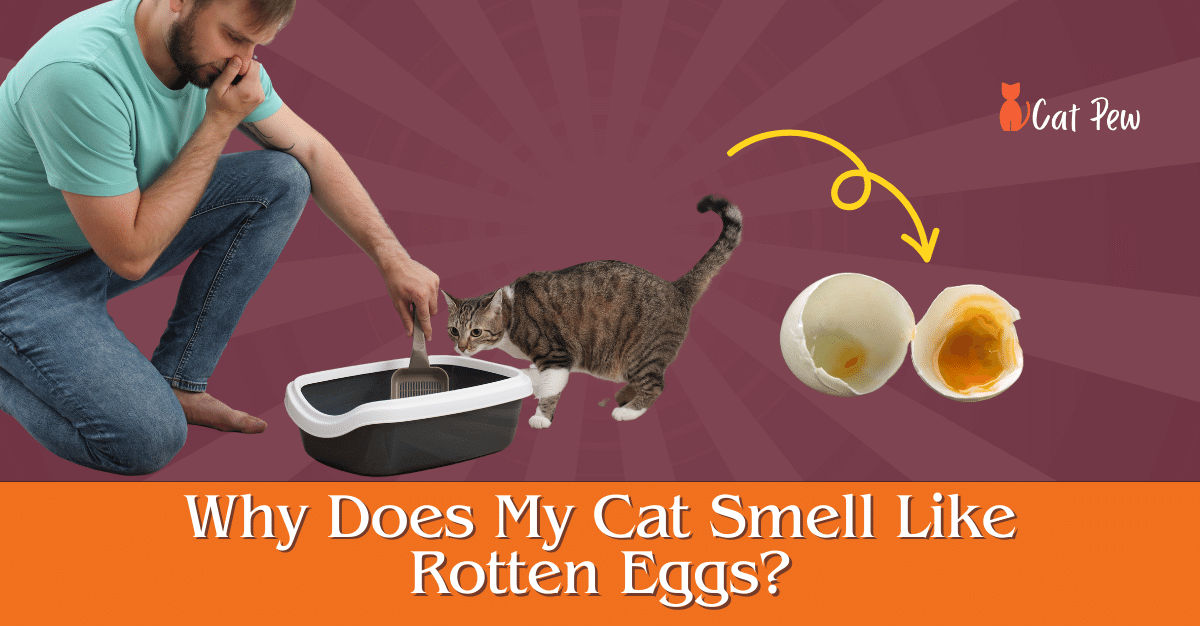Your cat may smell like rotten eggs due to a condition called anal gland infection or an overactive anal gland. Poor diet or gastrointestinal issues can also contribute to this odor.
It is important to address this issue promptly as it can be uncomfortable and indicate underlying health problems. Now, let’s dive deeper into the reasons why your cat may have this unpleasant smell and how to resolve it.
Potential Health Issues

If your cat smells like rotten eggs, it could indicate potential health issues that need attention. This unpleasant odor may be caused by anal gland problems, dental issues, or digestive problems. Veterinary care is crucial to identify and treat any underlying conditions affecting your cat’s well-being.
Food Allergies And Intolerances
If your cat has a foul odor resembling rotten eggs, it could be a sign of food allergies or intolerances. Cats can be sensitive to certain ingredients in their food, causing digestive issues and unpleasant smells. It’s important to carefully review the ingredients list of your cat’s food and eliminate any potential allergens.
- Poultry
- Beef
- Fish
- Dairy products
By switching to a hypoallergenic or limited-ingredient diet, you can help identify and eliminate the specific ingredient causing the smell. Consult with your veterinarian to find the most suitable diet for your cat’s needs.
Digestive Problems
A strong odor resembling rotten eggs can also indicate digestive problems in your cat. Cats with sensitive stomachs or gastrointestinal issues may experience excessive gas production, leading to a foul smell. Poor digestion can be caused by various factors, including:
- Feeding improper or low-quality food
- Overeating or eating too quickly
- Ingesting foreign objects
- Gastrointestinal infections or illnesses
- Inflammatory bowel disease
It is essential to observe your cat’s eating habits and make necessary dietary changes to improve digestion. Offering small and frequent meals, introducing high-quality cat food, and ensuring your cat has access to clean water can help alleviate digestive issues.
Kidney Or Liver Disease
A urine-like or ammonia-like odor resembling rotten eggs can be indicative of kidney or liver disease in cats. These organs play a crucial role in eliminating toxins from the body, and when they aren’t functioning properly, certain metabolic byproducts build up and cause a foul smell.
Common signs of kidney or liver disease in cats include:
- Increased thirst and urination
- Weight loss
- Loss of appetite
- Vomiting
- Lethargy
- Yellowing of the eyes or gums
If you suspect your cat may have kidney or liver disease, it is vital to seek veterinary attention immediately. Early diagnosis and appropriate treatment can help manage the condition and improve your cat’s quality of life.
Inadequate Hygiene

As a responsible cat owner, keeping your furry friend clean and fresh is essential. However, if you find that your cat’s odor resembles rotten eggs, it could be a sign of inadequate hygiene. Cats are known for their cleanliness, and any deviation from their usual grooming habits can result in a foul odor. In this article, we will explore two common reasons why your cat may smell like rotten eggs: improper grooming habits and a dirty litter box.
Improper Grooming Habits
Grooming is an instinctive behavior for cats. They spend a significant amount of time licking their fur to remove dirt, debris, and odors. However, certain circumstances can disrupt their grooming routine, leading to an unpleasant smell. Here are a few factors that may contribute to improper grooming habits:
- Obesity: Extra weight can make it challenging for cats to reach certain areas of their body, resulting in a build-up of dirt and oils.
- Medical issues: Cats experiencing pain or discomfort due to dental problems, skin allergies, or infections may avoid grooming themselves properly.
- Old age: As cats age, they may experience mobility issues, making it harder for them to groom themselves adequately.
- Anxiety or stress: Cats that are anxious or stressed may neglect grooming as they focus on their emotional well-being.
Addressing the underlying cause of your cat’s improper grooming habits is crucial. Consulting with a veterinarian can help diagnose and treat any medical conditions. Additionally, ensuring your cat has a designated grooming area with brushes and combs can encourage them to maintain good hygiene habits.
Dirty Litter Box
The cleanliness of your cat’s litter box can directly impact their hygiene. Cats are naturally clean animals, and a dirty litter box can be a source of discomfort for them. Here are a few potential reasons why your cat’s litter box might be contributing to the rotten egg smell:
- Infrequent cleaning: Failure to scoop the litter box daily can lead to a build-up of waste and odors.
- Inappropriate litter: Certain litters may not control odors effectively, causing a foul smell to linger.
- Overcrowding: If you have multiple cats, inadequate litter box availability can lead to improper elimination and odors.
Maintaining a clean litter box environment is essential for your cat’s well-being. Scooping the box daily, replacing litter regularly, and providing enough litter boxes for multiple cats can help eliminate any unpleasant odors.
External Factors
Certain external factors can contribute to your cat’s unpleasant odor resembling that of rotten eggs. In this article, we will discuss three common factors: anal gland issues, urinary tract infections, and skin infections. By understanding these factors, you will be better equipped to address the source of the problem and help your feline friend smell fresh and clean again.
Anal Gland Issues
One of the potential reasons why your cat might emit a smell similar to rotten eggs is due to anal gland issues. These glands, located just inside your cat’s rectum, produce a smelly substance that is typically released during bowel movements. However, sometimes these glands can become blocked or infected, leading to an unpleasant odor.
If your cat is experiencing anal gland problems, they may also exhibit symptoms such as scooting their bottom along the floor, excessive licking or biting of the anal area, or even blood in their stool. In severe cases, your furry friend may require professional help from a veterinarian to manually express the anal glands and provide necessary treatment.
Urinary Tract Infections
Another external factor that could be causing your cat’s foul odor is a urinary tract infection (UTI). UTIs are common in both male and female cats and can cause discomfort and a variety of unpleasant symptoms. When a cat has a UTI, the bacteria in its urine can produce an odor resembling that of rotten eggs.
If your cat is experiencing a UTI, you may notice an increased frequency of urination, straining or crying while urinating, blood in their urine, or urinating outside of their litter box. It is crucial to seek veterinary assistance promptly if you suspect your cat has a UTI, as these infections can lead to more severe health problems if left untreated. Your veterinarian will be able to diagnose the UTI and provide the appropriate treatment, usually involving antibiotics.
Skin Infections
Lastly, skin infections can also contribute to the unpleasant smell emanating from your cat. Fungal or bacterial infections on the skin can produce odors reminiscent of rotten eggs. These infections can be caused by a variety of factors, including allergies, parasites, or a compromised immune system.
If your cat has a skin infection, you may observe symptoms such as hair loss, redness, itchiness, and a distinct odor coming from the affected area. It is essential to consult with a veterinarian for a proper diagnosis and treatment plan. Your veterinarian may recommend medicated shampoos, topical ointments, or oral medication to address the underlying infection and help your cat regain their healthy, odor-free coat.
In conclusion, external factors such as anal gland issues, urinary tract infections, and skin infections can all contribute to why your cat might smell like rotten eggs. It is essential to identify the root cause of the odor and seek appropriate veterinary care for your feline friend to ensure their comfort and well-being.
Behavioral Issues

One of the most curious questions cat owners often ask is, “Why does my cat smell like rotten eggs?” While there can be several reasons behind this unpleasant odor, including medical conditions and poor hygiene, certain behavioral issues may also be to blame. In this article, we will explore some common behavioral issues that can cause your feline friend to emit an odor reminiscent of rotten eggs.
Stress And Anxiety
Stress and anxiety can take a toll on your cat’s mental and physical well-being. When your furry companion feels stressed, their body may produce extra sebum, an oily substance secreted by the skin. This excess sebum can mix with naturally occurring bacteria on the cat’s fur, resulting in that unwelcome rotten egg aroma.
Besides the unpleasant smell, stress in cats can manifest in other ways too. Their behavior might change, such as becoming more reclusive or exhibiting aggressive tendencies. If you suspect that stress is the culprit behind your cat’s odor, it’s essential to identify and eliminate the source of their anxiety. Providing a calm and secure environment, with plenty of hiding spots and vertical spaces, could help alleviate their stress and reduce the smelly situation.
Overgrooming
Cats are meticulous groomers, so it’s no surprise that they spend a significant amount of time grooming themselves. However, excessive grooming, known as overgrooming, can lead to a range of issues, including that unpleasant rotten egg smell. Overgrooming typically occurs as a response to stress, boredom, or skin irritations.
When cats overgroom, they may inadvertently remove essential oils from their skin and fur, disrupting the natural balance and causing an unusual odor. Additionally, excessive licking can lead to skin irritation, which further contributes to the smell. If you notice your cat obsessively grooming and emitting a foul scent, it’s crucial to address the underlying cause. Providing environmental enrichment, such as interactive toys and playtime, and ensuring regular vet check-ups can help minimize overgrooming behavior.
Marking Territory
Cats have a strong instinct to mark their territory, and this behavior is often accompanied by scent marking. If your cat is emitting a smell similar to rotten eggs, it could be a result of their territorial marking. When cats mark their surroundings with urine, anal gland secretions, or even saliva, the odor can become quite pungent and reminiscent of sulfur or rotten eggs.
To prevent unwanted odors from territorial marking, it’s important to provide appropriate outlets for your cat’s natural behaviors. Ensuring they have an enriched environment with scratching posts, designated play areas, and multiple litter boxes can help reduce the need for marking. Spaying or neutering your cat can also help minimize territorial behaviors and their associated odors.
In conclusion, while there can be several reasons why your cat smells like rotten eggs, behavioral issues are among the potential causes. Stress and anxiety, overgrooming, and marking territory are just a few examples of behavioral issues that can lead to this unpleasant odor. By understanding these behaviors and addressing their underlying causes, you can help your feline companion regain their fresh and pleasant scent.
Prevention And Treatment
When it comes to preventing and treating the issue of your cat smelling like rotten eggs, there are a few key approaches you can take: adjusting their diet, establishing a regular grooming routine, and seeking veterinary care and medication. Let’s delve into each of these areas in more detail.
Adjusting Diet
One of the first steps you can take in preventing your cat from smelling like rotten eggs is to adjust their diet. A cat’s diet plays a crucial role in their overall health, including the scent of their coat. By ensuring they are consuming a nutritious and balanced diet, you can minimize the chances of unpleasant odors emanating from their fur.
When selecting cat food, opt for high-quality options that contain real meat as the main ingredient. Look for products that are free from artificial additives and fillers, as these can contribute to unpleasant odors in your cat’s body.
Regular Grooming Routine
Grooming your cat regularly is another important aspect of preventing and treating the issue of a foul-smelling feline. Regular grooming will not only remove dirt and debris from their fur but also help to control any potential odors.
Consider establishing a grooming routine that includes brushing their coat to remove excess hair and stimulate healthy oil production. Additionally, you can use pet-friendly wipes to clean their fur and remove any lingering smells. Remember to be gentle and patient while grooming your cat to ensure a positive experience for both of you.
Veterinary Care And Medication
If adjusting your cat’s diet and establishing a grooming routine does not resolve the issue, it is crucial to seek veterinary care. Your veterinarian will be able to conduct a thorough examination to determine the cause of the foul odor and recommend appropriate treatment.
In some cases, your vet may prescribe medication or recommend specific treatments to address the underlying issue. It is important to follow their instructions carefully and administer any prescribed medications as directed to ensure the best possible outcome for your furry friend.
Remember, cats can develop a range of health issues that may contribute to unpleasant smells, including dental problems, skin infections, or gastrointestinal disorders. By seeking professional help, you can identify and address these issues promptly, keeping your cat happy, healthy, and odor-free.
Frequently Asked Questions On Why Does My Cat Smell Like Rotten Eggs
Why Does My Cat Smell Like He’s Rotting?
A rotting smell in your cat may be caused by dental disease, infected wounds, or digestive issues. It’s crucial to take your cat to the vet for a check-up to determine the underlying cause and provide appropriate treatment. Poor hygiene can also contribute to the odor.
Why Does My Cat Have Sulfur Smelling Gas?
Cats may have sulfur-smelling gas due to their diet or digestive issues. Certain foods or a sudden change in diet can cause gas with a sulfurous odor. If your cat’s gas persists or is accompanied by other symptoms, it’s best to consult a veterinarian for further evaluation and advice.
What Causes A Bad Smell Like Rotten Eggs?
A bad smell like rotten eggs is usually caused by hydrogen sulfide gas, which is released when organic matter breaks down. It can be found in sewage, natural gas, and certain foods.
Why Does My Cat Smell Like Rotten Fish?
A cat may smell like rotten fish due to an infection or dental issues. Cats have scent glands and may release a fishy odor when they are sick. It’s crucial to consult a vet for a proper diagnosis and treatment to address the issue.
Conclusion
To conclude, understanding why your cat smells like rotten eggs is crucial for their health and overall well-being. Identifying the underlying causes, such as poor dental hygiene, digestive issues, or skin infections, is essential in addressing this unpleasant odor. Regular grooming, a balanced diet, and routine veterinary check-ups can help mitigate this problem.
By taking proactive measures, you can ensure that your furry friend remains clean, healthy, and odor-free.

Winston
I'm Winston, the author of this feline-focused (Catpew.com) blog . My love for cats goes back to my childhood, when I spent countless hours playing with my family's tabby, Mittens. This furry friend instilled in me a deep appreciation for the unique personalities, playful nature, and unconditional love that cats offer.

